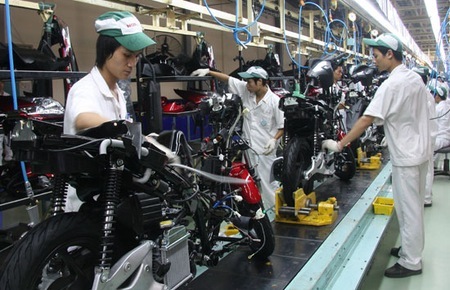VietNamNet Bridge – Rushing to leave China to avoid possible negative impacts to be caused by the sovereign dispute, Japanese investors are now eyeing South East Asia, including Vietnam.
VietNamNet Bridge – Rushing to leave China to avoid possible negative impacts to be caused by the sovereign dispute, Japanese investors are now eyeing South East Asia, including Vietnam.

International press has reported that some big Japanese automobile and electronics groups such as Toyota, Honda, Nissan and Panasonic have scale down their production or shut down factories in China. Meanwhile, Chinese agencies seem to try to put big difficulties for the investors from Japan.
This has promoted Japanese investors to rush to look for other alternative places, because it would be better not to “put all eggs into the same basket.”
China would remain the most important trade partner for Japan, but Japanese businesses would surely cast its eyes to other regional countries, especially the ones in South East Asia. This is really a golden opportunity for Vietnam to attract the Japanese investment wave.
However, experts think that Vietnam has some disadvantages in attracting the investments in some key industries.
It’s difficult to call for investment in hi-tech industries
Experts believe that Vietnam does not have high opportunities to attract Japanese investments into the automobile and electronics industries.
David Horlock, a senior executive of Intertek, a British consultancy group, in an interview given to VietNamNet recently, said in fact, Japanese have been looking for alternative investment places for a long time already, after they realized that the profits they make in China have been decreasing.
The higher labor cost and workshop premises rents, plus the high inflation all have led to the investors’ profits decreasing sharply. The profit investors make in the southern areas of China has dropped from 25 percent to 5 percent on average. This has forced investors to look for the regions which require lower investment rates.
It’s obvious that many Japanese investors have arrived in Vietnam, where the labor cost is low, just equal to ½ of that in Chinese southern areas, where there is a long coastline, which allows to save the transport cost.
However, he said he can only seen the investment flow into the labor intensive industries such as garment or wooden furniture, while there has been no investment wave in hi-technology industries such as electronics or automobile.
Three problems that slows investment flow
Experts believe that Vietnam remains outside the investment re-direction wave because of its unreasonable policies, the lack of the workforce and the underdeveloped supporting industries.
Ngo Van Tru, Deputy Director of the Heavy Industry Department of the Ministry of Industry and Trade, has also admitted that Vietnam’s policies still have problems and they remain unattractive to hi-tech investors.
Japanese would also be hesitant to make investment when considering the complicated procedures and inconsistent policies applied in Vietnam.
In the automobile industry, for example, automobile manufacturers always complain that the policies change so regularly that they cannot draw up their business plans.
The poor infrastructure and the lack of the workforce both have also caused worries to Japanese investors. Hideo Naito from JBIC, also said that Vietnam’s infrastructure system is poorer than that of Thailand, Indonesia and Malaysia, which makes it difficult for Vietnam to “absorb” the huge investment capital.
Toshio Nakamura, Managing Director of the Japan Chamber of Commerce and Industry, who came to Vietnam for the second time when heading a group of businesses to Vietnam some days ago, said he could not see any considerable improvement in the business environment in Vietnam.
The weak supporting industries have also been cited as a main reason that makes Japanese automobile and electronics investors to keep away from Vietnam. In general, Malaysia, Indonesia or the Philippines would be the priority choices, because foreign manufacturers would be easily find material suppliers in the countries.